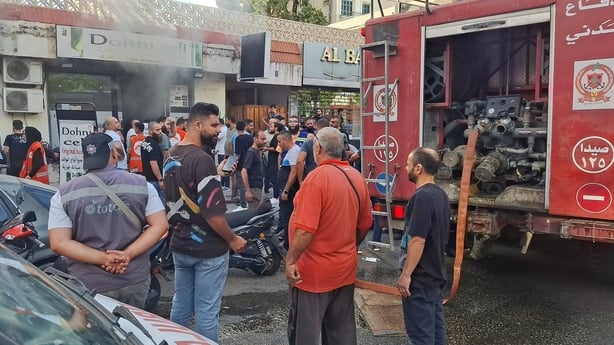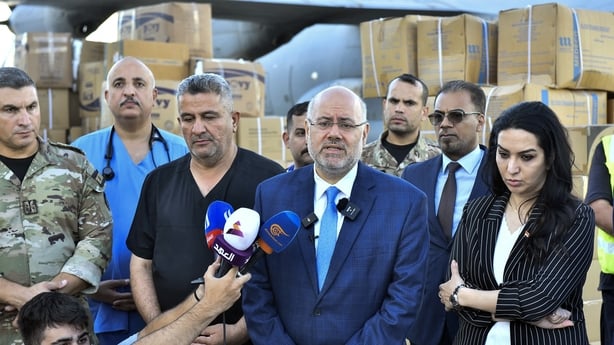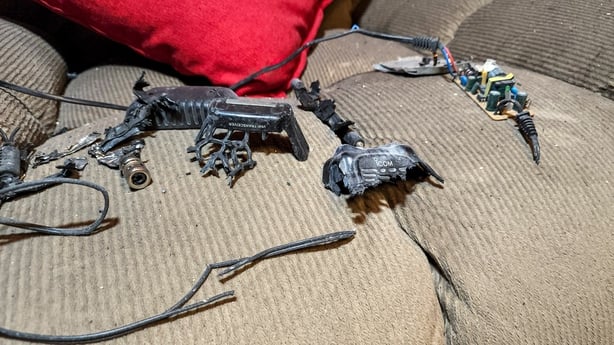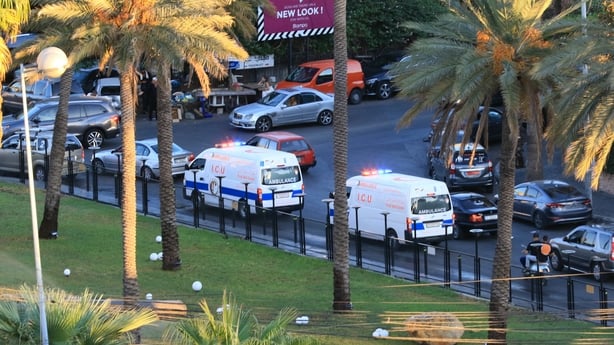Twenty people have been killed and more than 450 people have been injured after walkie-talkies used by Lebanon's armed group Hezbollah detonated across the country's south and in the southern suburbs of the capital Beirut, the Lebanese Health Ministry has said.
"The wave of enemy explosions that targeted walkie talkies... killed 20 people and wounded more than 450," the ministry said in a statement.
At least one of the blasts took place near a funeral organized by Iran-backed Hezbollah for those killed the previous day when thousands of pagers used by the group exploded across the country.
The group said it had attacked Israeli artillery positions with rockets in the first strike at its arch-foe since pager blasts wounded thousands of its members in Lebanon and raised the prospect of a wider Middle East war.
The hand-held radios were purchased by Hezbollah five months ago, around the same time that the pagers were bought, said a security source.
Lebanon's Red Cross said on X that it was responding with 30 ambulance teams to multiple explosions in different areas, including the south of Lebanon and the Bekaa Valley.

Israel's spy agency Mossad, which has a long history of sophisticated operations on foreign soil, planted explosives inside pagers imported by Hezbollah months before Tuesday's detonations, a senior Lebanese security source and another source told Reuters.
The UN High Commissioner for Human Rights Volker Turk called for an independent investigation into the events surrounding exploding pagers.
The UN Security Council will meet on Friday over the pager blasts after a request from Algeria on behalf of Arab states.
There was no immediate word on when Hezbollah had launched its latest rocket attack, but normally the group announces such strikes shortly after carrying them out, suggesting it fired at the Israeli artillery positions.
The Israeli military said warning sirens sounded a number of times in northern Israel but there were no reports of any damage or casualties.

Israeli Defence Minister Yoav Gallant said the war's "centre of gravity" was moving north, where Israel has clashed daily with Lebanon's Hezbollah.
"The centre of gravity is moving northward - resources are being allocated (to this front)," Mr Gallant said during a visit to an Israeli air base, according to a statement issued by his office.
"We are at the start of a new phase in the war - it requires courage, determination and perseverance on our part."
Hezbollah has vowed to retaliate against Israel, whose military declined to comment on the blasts.
The two sides have been engaged in cross-border warfare since the Gaza conflict erupted last October, fuelling fears of a wider Middle East conflict that could drag in the United States and Iran.
Jordan's Foreign Minister Ayman Safadi accused Israel of pushing the Middle East to the brink of a regional war by orchestrating a dangerous escalation on many fronts.
"Hezbollah wants to avoid an all-out war. It still wants to avoid one. But given the scale, the impact on families, on civilians, there will be pressure for a stronger response," said Mohanad Hage Ali of the Carnegie Middle East Center.

Hezbollah, Iran's most powerful proxy in the Middle East, said in a statement it would continue to support Hamas in Gaza and Israel should await a response to the pager "massacre" which left fighters and others bloodied, hospitalised or dead.
One Hezbollah official said the detonation was the group's "biggest security breach" in its history.
Twelve killed, thousands injured from pager detonations
It comes after Lebanon's Health Minister confirmed that 12 people were killed after paging devices used by Hezbollah members exploded across Lebanon a day earlier, adding that some wounded were treated in Syria.
"After checking with all the hospitals", the toll was revised to "12 dead including two children", Firass Abiad told a news conference, putting the number of wounded between 2,750 and 2,800.
Some cases in the Lebanon's eastern Bekaa Valley "were transferred to Syria", while "other cases will be evacuated to Iran", he added.

The detonation of thousands of pagers has left a mysterious trail from Taiwan to Hungary, while raising the prospect of another full-scale war in the Middle East between the Iran-backed group and arch-foe Israel.
Israel's Mossad spy agency, which has a long history of pulling off sophisticated attacks on foreign soil, planted explosives inside pagers imported by Hezbollah months before Tuesday's detonations that killed nine people, including a young girl, a senior Lebanese security source and another source told Reuters.
The operation was an unprecedented Hezbollah security breach, wounding many of the group's fighters and Iran's envoy to Beirut.
The Lebanese security source said the pagers were from Taiwan-based Gold Apollo, but the company said in a statement it did not manufacture the devices.
It said they were made by a company called BAC - based in the Hungarian capital - which has a licence to use its brand.
Hezbollah has vowed to retaliate against Israel, whose military declined to comment on the blasts. The two sides have been engaged in cross-border warfare since the Gaza conflict erupted last October.
We need your consent to load this rte-player contentWe use rte-player to manage extra content that can set cookies on your device and collect data about your activity. Please review their details and accept them to load the content.Manage Preferences
While its war in Gaza has been Israel's main focus since 7 October, fighting along Israel's northern border with Lebanon has fuelled fears of a regional conflict that could drag in the US and Iran.
"Hezbollah wants to avoid an all-out war. It still wants to avoid one. But given the scale, the impact on families, on civilians, there will be pressure for a stronger response," said Mohanad Hage Ali of the Carnegie Middle East Center.
Hezbollah said in a statement that "the resistance will continue today, like any other day, its operations to support Gaza, its people and its resistance which is a separate path from the harsh punishment that the criminal enemy (Israel) should await in response to Tuesday's massacre".
The plot appears to have been many months in the making, several sources told Reuters.
It followed a series of assassinations of Hezbollah and Hamas commanders and leaders blamed on Israel since the start of its Gaza war.
Read more: What we know about the deadly pager blasts in Lebanon
